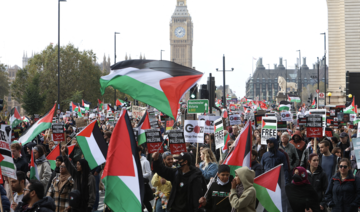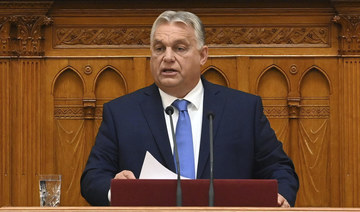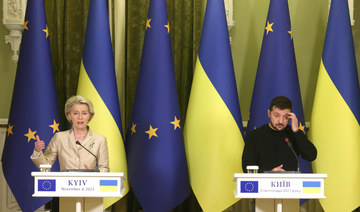PARIS: A project to build a nuclear plant at Hinkley Point in Britain will overrun by £1.5 billion ($1.95 billion) and may face further delays, its main supplier said.
EDF, the state-run French company that has the lion’s share of the controversial scheme, made the announcement after a long review.
EDF is part of a French-Chinese consortium that was awarded the two-reactor project last year despite criticism from green groups and cost warnings from experts.
“The final project costs are now estimated at £19.6 billion at 2015 rates, an increase of £1.5 billion,” EDF said in a statement.
The higher estimate derives from “better discernment of the design” and “the volume and sequencing of work on site and the progressive implementation of suppliers’ contracts,” it said.
It also warned of a possible delay of 15 months in delivering the first reactor, and nine months for the second.
If this risk is confirmed, the deal would add “around £0.7 billion” to costs, EDF said.
The announcement came after EDF on June 26 acknowledged that it was carrying out a “full review” of costs and scheduling.
Named Hinkley Point C, the project, built in the southwestern English county of Somerset, is being showcased as the first British nuclear power station to be built in more than two decades.
It will provide seven percent of Britain’s power needs, replacing old, carbon-emitting coal-fired plants, according to the British government.
But the costs and timetable have been repeatedly revised. In 2007, an EDF boss promised that, in 2017, Britons would be able to cook their Christmas turkeys using electricity from the facility.
Critics have focused on the proposed design, which uses a novel EPR reactor that has run into huge problems of cost overruns and delays at sites in France and Finland.
On Monday, EDF said that construction work on the first reactor at Hinkley Point was still scheduled for “mid-2019.”
However, the date depended on the final design of the reactor, it said. This decision is expected by the end of 2018, but “the schedule is tight,” it admitted.
Detractors also question an electricity price guarantee to EDF of £92.5 for every megawatt hour of power produced by Hinkley over the following 35 years, rising with inflation, despite falling energy prices.
On June 23, Britain’s National Audit Office (NAO) said the expected cost of top-up payments had ballooned from £6 billion to nearly £30 billion.
The deal “has locked consumers into a risky and expensive project with uncertain strategic and economic benefits,” the NAO said.
Environmentalists are also fiercely opposed, urging the government to instead focus on renewable sources like wind and solar power to meet Britain’s energy needs.
The 3,200-megawatt project, scheduled under the deal to go online in 2025, has a designed operational lifetime of 60 years.
The deal was approved by Prime Minister Theresa May’s government only last September, amid uncertainty about the future of the British economy caused by Brexit.
EDF, mainly owned by the French government, is funding around two-thirds of the cost and its Chinese partner, China General Nuclear Corporation,is financing the remainder.
Construction work on non-reactor structures began in March this year, and EDF has already signed major contracts with suppliers such as the French giants Bouygues and Areva and General Electric of the US.
Internal divisions surfaced last year within EDF about pushing ahead with Hinkley Point while the firm struggled with a debt mountain of more than 37.4 billion euros and grappled with the merger of the reactor unit of French nuclear builder Areva.
The company’s financial director, Gerard Magnin, quit in disagreement with the plan. The remaining 17 members of the board approved it by only 10 votes to seven at a crunch meeting on July 28.
Delays, cost overrun seen for contested UK nuclear plant
Delays, cost overrun seen for contested UK nuclear plant

UK minister accused of ‘witch hunt’ against pro-Palestine movement

- Michael Gove: University encampments represent ‘antisemitism repurposed for Instagram age’
- Palestine Solidarity Campaign: Britain ‘complicit’ in ‘genocide in Gaza’
LONDON: The UK’s secretary of state for leveling up, housing and communities has been accused of conducting a “witch hunt” after accusing pro-Palestinian demonstrators of antisemitism.
Political parties and the Palestine Solidarity Campaign condemned Michael Gove, with the Revolutionary Communist Party calling his accusations an attempt to distract from the Conservatives’ “support for genocide” in Gaza.
The Socialist Workers Party said he is conducting a “witch hunt (against) the Palestine solidarity movement.”
Gove announced plans to make protest organizers foot the cost of policing at pro-Palestinian demonstrations, saying they are not doing enough to stop some attendees spreading anti-Jewish messages.
“Many of those on these marches are thoughtful, gentle, compassionate people — driven by a desire for peace and an end to suffering. But they are side by side with those who are promoting hate,” he added.
“The organizers of these marches could do everything in their power to stop that. They don’t.”
Gove also said pro-Palestinian university encampments across the UK represent “antisemitism repurposed for the Instagram age,” and their presence has facilitated hostility against Jewish students on campuses.
Ben Jamal, PSC director, said in a statement: “Apologists for Israel’s genocidal violence and system of apartheid have lost the democratic and legal arguments, but continue to attempt to delegitimize Palestinian solidarity. They will not succeed.
“At a moment when Israel is on trial in the world’s highest court for the crime of genocide and the day after its Prime Minister has been threatened with ICC (International Criminal Court) arrest warrants for war crimes, it is grotesque that these smears continue.
“The real issues are that the UK government continues to arm Israel, refuses to resume funding to UNRWA (the UN Relief and Works Agency for Palestine Refugees), and is attempting to protect Israel from legal accountability.
“Far from stopping the genocide in Gaza as required under international law, the UK is complicit.”
NGOs seek climate trial of French oil giant TotalEnergies

- The complaint was filed at Paris judicial court days before TotalEnergies holds annual shareholders meeting
- The offenses carry prison sentences ranging between one year to five years and fines of as much as $163,000
PARIS: NGOs filed a criminal complaint against French oil giant TotalEnergies and its top shareholders in Paris on Tuesday, seeking a trial for involuntary manslaughter and other consequences of climate change “chaos.”
The case targets the company’s board, including chief executive Patrick Pouyanne, and major shareholders that backed its climate strategy, including US investment firm BlackRock and Norway’s central bank, Norges Bank.
In a statement, the three NGOs and eight individuals said they accused the group of “deliberately endangering the lives of others, involuntary manslaughter, neglecting to address a disaster, and damaging biodiversity.”
The complaint was filed at the Paris judicial court, which has environmental and health departments, three days before TotalEnergies holds its annual shareholders meeting.
The prosecutor now has three months to decide whether to open a judicial investigation, the NGOs said. If it does not go ahead, the plaintiffs can take their case directly before an investigative judge.
The offenses carry prison sentences ranging between one year to five years and fines of as much as 150,000 euros ($163,000).
“This legal action could set a precedent in the history of climate litigation as it opens the way to holding fossil fuel producers and shareholders responsible before criminal courts for the chaos caused by climate change,” the NGOs said.
The plaintiffs include “victims or survivors of climate-related disasters” in Australia, Belgium, France, Greece, Pakistan, the Philippines and Zimbabwe.
TotalEnergies did not immediately return a request for comment.
Oil and gas companies, other corporations and governments are facing a growing number of legal cases related to the climate crisis worldwide.
TotalEnergies is facing other legal cases in France related to climate change.
Outside the Paris judicial court, the NGOs held a banner reading “climate change kills” and “let’s put shareholders behind bars” — with the “share” in shareholders crossed out and replaced by the “death.”
The latest complaint aims to “recognize the deadly consequences of their decisions, their stubbornness in voting for fossil projects which threaten the stability of the climate and therefore of all living things,” Claire Nouvian, founding director of conservation group Bloom, said at a news conference.
Fossil fuels — oil, gas and coal — are the biggest contributors to heat-trapping greenhouse gas emissions.
One of the plaintiffs in the Paris case is Benjamin Van Bunderen Robberechts, a 17-year-old Belgian whose friend Rosa died in flash floods in Belgium at the age of 15 in 2021.
In Paris to file the complaint, he said he had come to “demand justice” against those “who choose profit over human lives and climate.”
In their statement, the plaintiffs said “TotalEnergies has known the direct link between its activities and climate change” since at least 1971.
“TotalEnergies followed a climate skeptic line in order to waste time, delay decision-making and protect its increasing investments in fossil fuels,” they added.
They said they hope to set a legal precedent “whereby opening new fossil fuel projects would be considered criminal.”
While the case was filed on Tuesday, TotalEnergies announced a deepwater project off the coast of Angola, with production set to start in 2028 to extract 70,000 barrels per day.
Gunmen kill around 40 people in attack in northcentral Nigeria: official

- Armed men invaded Zurak community, shooting sporadically and torching houses
- Local youth leader Shafi’i Sambo also said at least 42 people had been killed in the raid
LAGOS: Gunmen riding motorbikes killed around 40 people in a raid on a mining community in northcentral Nigeria, opening fire on residents and torching homes, the local government said on Tuesday.
The attack late on Monday on Wase district in Plateau state was the latest violence in an area which has long been a flashpoint for disputes over resources and for outbreaks of intercommunal clashes.
Armed men invaded Zurak community, shooting sporadically and torching houses, Plateau state commissioner for information Musa Ibrahim Ashoms told AFP by telephone.
“As we speak, about 40 people have been confirmed dead. Zurak is a popular mining community,” he said.
Local youth leader Shafi’i Sambo also said at least 42 people had been killed in the raid.
Wase has deposits of zinc and lead, while Plateau as a whole is known for its tin mining industry.
Sitting on the dividing line between Nigeria’s mostly Muslim north and predominantly Christian south, Plateau often sees outbreaks of violence sparked by disputes between nomadic herders and pastoral farmers.
Climate change has also helped escalate tensions over grazing land, water access and other resources such as the state’s metal reserves.
Parts of northwest and northcentral Nigeria have also been terrorized by heavily armed criminal gangs, who raid villages to loot and carry out mass kidnappings for ransom.
In January, intercommunal clashes erupted in Plateau’s Mangu town that left churches and mosques burned, more than 50 people dead and thousands displaced.
Over 3,000 Ukrainian inmates seek to join military

- Ukraine is suffering critical ammunition and manpower shortages on the battlefield
- “We predicted this before the adoption of this law,” Deputy Minister of Justice Olena Vysotska said
KYIV: Thousands of Ukrainian inmates are seeking to join the military, Kyiv said Tuesday, following a decision by lawmakers enabling some categories of prisoners to join the armed forces.
The move echoes a policy in Russia, where tens of thousands of prisoners have been sent to Ukraine with the promise of amnesty and were killed in gruelling battles that produced few gains.
Ukraine is suffering critical ammunition and manpower shortages on the battlefield that have allowed Russian forces to advance on the eastern and northern front lines.
“This is more than 3,000 people. We predicted this before the adoption of this law,” Deputy Minister of Justice Olena Vysotska said, referring to the number of prisoners who have submitted applications to join the military.
She said authorities had identified 20,000 eligible prisoners and that of them, 4,500 had “expressed interest” in joining. She added that the figure was likely to fluctuate.
Only prisoners with fewer than three years left on their sentence can apply. Mobilized prisoners are granted parole rather than a pardon.
Among those not eligible to serve include those found guilty of sexual violence, killing two or more people, serious corruption and former high-ranking officials.
Russia has recruited prisoners to serve on the front lines since the first days of its invasion, initially offering presidential pardons for six months’ service.
EU states push for June start to Ukraine membership talks

- To actually begin the negotiations the bloc’s member states still have to sign off on a formal framework for the process
- At a meeting in Brussels, France’s EU affairs minister Jean-Noel Barrot called for “the effective opening of negotiations“
BRUSSELS: Several EU countries on Tuesday called for the bloc to start membership negotiations with Ukraine and Moldova in June, but Hungary threatened to throw a spanner in the works.
The 27-nation EU took the landmark step in December of agreeing to open talks on its war-torn neighbor — and fellow ex-Soviet state Moldova — joining the club.
But to actually begin the negotiations the bloc’s member states still have to sign off on a formal framework for the process, proposed in March by Brussels.
At a meeting in Brussels, France’s EU affairs minister Jean-Noel Barrot called for “the effective opening of negotiations” before Belgium’s rotating presidency concludes at the end of June.
That statement was echoed by other ministers — including from Ireland and Sweden.
The push to move Ukraine onto the next step in its quest for EU membership comes amid fears that Hungary, the friendliest country with Moscow in the bloc, could stall progress when it takes over the presidency after Belgium.
Budapest has been hostile to Kyiv’s bid to join, arguing that Ukraine is getting pushed ahead in the queue without meeting the required criteria.
“There can be no exception on the basis of political or ideological considerations,” Hungarian minister Zoltan Kovacs said.
“There is very little, if any, progress. Again, I can repeat to you that membership, approval should be a merit based process. No exceptions.”
Another possible hurdle could come from a new right-wing government being formed in The Netherlands opposed to any new enlargement of the bloc.
Ukraine applied to join the EU shortly after Russia launched all-out invasion in February 2022.
Starting the negotiations would put Ukraine still only at the start of what is likely to be a years-long process of reforms before it can finally become a member.

















